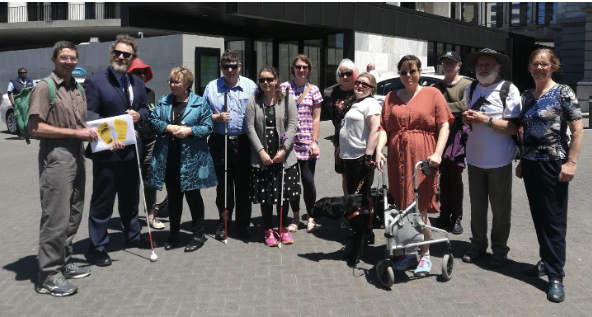Award
Walking Champion
Winner
Chris Teo-Sherrell
In brief
The combined attack on footpaths of unregulated e-scooters and a proposed rule change to allow cyclists, e-bikes and e-scooters everywhere galvanised Chris to lead a coalition of fourteen organisations to show the detriment to vulnerable walkers to officials, Ministers and MPs, media and the public, raising public awareness.
The detail
(From the nomination form.)
Motivation for the initiative
 In December 2018 the NZTA Board quietly decided e-scooters should go on the footpaths, not in cycle lanes nor on the road. Then in 2019 we heard that an Accessible Rules Package would legitimise the practice (as well as making some other positive changes). There were to be no select committee hearings nor opportunity to present orally.
In December 2018 the NZTA Board quietly decided e-scooters should go on the footpaths, not in cycle lanes nor on the road. Then in 2019 we heard that an Accessible Rules Package would legitimise the practice (as well as making some other positive changes). There were to be no select committee hearings nor opportunity to present orally.
At first Ministers were reluctant to meet us on the issue, media didn’t publish stories and people believed the original “allow the kids to cycle on footpaths” was all there was to the proposed “Accessible Streets” rules package.
Living Streets Aotearoa is a volunteer-run organisation so it was a challenge to get our arguments into the public arena. Many disability groups were concerned about the change when alerted to it but hadn’t know about it.
Chris co-ordinated the petition and its presentation, vetted letters to MPs and has been a calm and reasonable voice throughout NZTA’s misguided approach to increase cyclists’ apparent safety at the cost of deterring vulnerable walkers from going out at all, the loss of relaxation when walking and the risk of serious injury crashes on the footpath.
Chris and Living Streets Aotearoa have always campaigned for a reduction in motorised traffic volume and speed, argued for public transport and less car-dependent urban planning. However Chris has been at the sharp end of attacks from those who should be our allies because we have resisted surrendering our safe place, the footpath. We will know the success of the project once the rules are decided but Chris has made the silent voice of pedestrians very audible in the service of Footpaths4Feet.
Everyone is a walker so everyone is affected. Those most affected are the very old and very young, those with vision, hearing or cognitive impairment. 20% of the population has some form of impairment and 86% of the population lives in towns and cities.
Success to date of the initiative
Even with Covid-19 dominating the news, there have been print and radio items about who should be entitled to travel on the footpath. The modest funding has been used to promote the petition and boost our FB pages. The communication between Living Streets Aotearoa and disability advocates has been hugely enhanced. It has been testing to challenge our usual allies, including some cyclists and urban planners and the Minister and Associate Minister of Transport as on many other aspects of transport we have much in common.
The incoming donations have exceeded any other cause we’ve promoted although they still fall short of our costs.
We will know the specific success or otherwise when NZTA recommendations go to the Economic Development Committee and they decide which option to accept. They will at least know of our concerns. Without Chris’s leadership they could say they didn’t realise the consequences.
Potential applicability of initiative to other locations or organisations
The initial reluctance of people to consider our issues has morphed into a real chance that a less disruptive option will be chosen. This has taken many letters, discussions and a range of approaches. Lessons about petitions, media and working in a coalition can apply to other walking matters. Information sharing about OIAs, legal approaches and which Ministers and MPs are sympathetic will continue on other relevant issues and campaigns.
Footpaths4Feet is the only multilateral approach on this issue.
